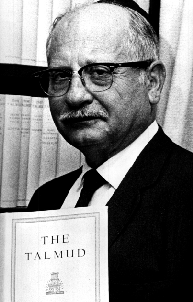 |
He was a Palestinian, born in the Holy Land 40
years before the establishment of the modern State of Israel. Binyamin Englander was a
native of Petach Tikvah, which had been founded by his grandfather Yehoshua Stampfer in
1870 as the Jews' first defensive agricultural settlement. By the time Rabbi Englander
died in 1989, the settlement had grown into an industrialized city. So in 1947, the New
Jersey newspapers were quite accurate when they welcomed him to a pulpit in Irvington as a
"Palestinian rabbi," even though he had spent most of his life in the United
States.
Schooled in Philadelphia and Cleveland, Ben Englander went on to become a modern,
religiously devout Conservative rabbi. He was one of those early graduates of the
Jewish Theological Seminary of America in New York who were respected by their
Orthodox counterparts for a profound commitment to traditional religious education,
values and lifestyles, albeit with a more open attitude toward accommodation with the
modern world.
In 1935, he found a true intellectual partner in Deborah Weitz, married her and started
a family. He earned his rabbinical degree in 1934, his masters of Hebrew literature in
1949 and his doctorate of divinity in 1966, all at JTS.
Rabbi Englander served congregations in Philadelphia and Brooklyn prior to his
24-year-long post in Irvington, N.J.; he took temporary positions afterward in Ottawa,
Ontario (Canada); Louisville, KY, and Bethlehem, N.H. He retired in 1978 and spent
his last years in Riverdale and Monsey, N.Y.
To our loss, it was not his habit to work out his weekly sermons on paper. And, even
after his retirement, he was reluctant to publish his holiday messages, whose notes
were carefully filed away. In the years since the passing of our parents, however, their
two children -- Dan and his wife Linda and I and my husband Al Kustanowitz -- and
six grandchildren have read many of his divrei Torah at our holiday dinner tables and
found that his insights are still remarkably relevant.
In his last coherent moment, my father told me to tell my husband that perhaps they
should be published, "not for the glory of the writer, but for the edification of the
reader." Al has chosen the Web as the vehicle to carry my father's words to the
world.
May these inspirations and his memory ever be a source of blessing
Shulamit |
